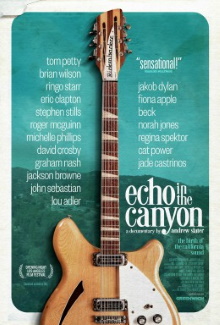
This documentary was added to my list because of its prominence among critics last year but I never realized how heavily inspired it was by the Jacques Demy film Model Shop. By pure coincidence, we only got around to watching that earlier this year and we’re very glad we did as Echo in the Canyon refers to it almost constantly as a sort of record of what mid-1960s Los Angeles looked and felt like. The producer himself acknowledges that it was watching the film that inspired him to embark on this project to find out what the music scene at the time was light and to organize a sort of tribute concert for those great bands.
This film follows host and musician Jakob Dylan as he meets up with veterans of the mid-1960s music scene in Laurel Canyon, Los Angeles. The focus is on four groups in particular, The Byrds, The Beach Boys, Buffalo Springfield, and The Mamas and the Papas. Across the various interviews, they touch on how these groups came to congregate around the area, how the evolving musical style involved infusing electric elements into the prevalent folk music of the time and how they all influenced one another. In particular, The Byrds who seemed to have been the earliest to settle in the area speak about how they were all blown away by the success of The Beatles and wanted to emulate them. In between the interviews, the film also includes shots of modern musicians rehearsing the classic hits of these groups and then performing them as part of a celebration commemorating that particular period of musical history. Inevitably, it also covers how the scene came to an end in only a few short years as powerful individual creative voices within the various groups led to them being broken up but of course the influence that they would have on the history of music would endure forever.
I’m not much of a music enthusiast and I have only a passing acquaintance with the many groups featured here. I’m sure details like the cross pollination and growing sophistication of musical styles must be very important and interesting but I just don’t know enough about music to appreciate these lessons. Still I can appreciate good music as much as anyone and it is a lot of fun to listen to all these classics that I probably should have known about way before this. It’s also cool to learn about this tiny slice of history and it even has salacious gossip here and there and fun little anecdotes like the time a party including many of them was busted by the police and the owner of the house ran away. It’s especially heartening to see how all of these musicians freely learn and copy from one another without any acrimony though of course it matters that the influences are acknowledged. The best example of this is how Bryan Wilson of The Beach Boys created an album after hearing The Beatles and that directly led the latter to create Sgt. Pepper.
Yet while the music is good and this makes for a worthy subject, this documentary itself feels a little lacking. Taking inspiration from Model Shop is laudable but this documentary leans on it so heavily, replaying the same clips from the Demy film over and over again, that it starts to feel lazy, as if there aren’t any other films that can also be used to reference that period. Then there’s how the interviews start to seem like a closed loop of musicians constantly talking about and praising one another. How about the public and the society at large at the time? As a member of The Byrds remarks, one of the distinguishing features of the era was the shift to a more poetic style of lyrics rather than empty banalities. Yet such lyrics must certainly reflect what was happening around them during those tumultuous times and this film is completely silent on that front. This documentary is so obsessed with the music itself that it ignores the events and social changes that inspired that music. After all, Model Shop was more than just about what Los Angeles looked and felt like at the time. It was about the Vietnam War still happening in the background, about people trying to get by while dodging government authoritarianism, and about celebrating counterculture. Echo in the Canyon has none of that, being content to backslap musicians who had achieved fame and fortune through their music.
One of the strangest things about this documentary is that it talks about Model Shop, a 1969 film by a famous director, as if it were somehow some kind of novel find. Indeed it seems that the director stumbled onto it while watching the Turner Classic Movies channel and was duly impressed. That explains why this film seems a little shallow and empty. For example why film Jakob Dylan and the other modern musicians sitting around the table and casually talking about the era instead of interviewing actual historians of music? It’s as if it’s just an afterthought to the tribute concert that they wanted to put on and the associated album, and those were what they were really interested in. This is still a solid and enjoyable film but it should have been so much better.